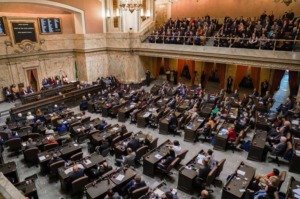As spring arrives in our state, the 2025 legislative session has concluded. The final weeks mirrored the season, marked by significant activity, progress, and a feeling of fresh starts. On Sunday, the legislature adjourned (Sine Die) after crucial budget votes and the finalization of bills that will impact our communities. Although the legislative session has ended, important work continues.
In this post, I’ll share updates on the key legislation that you helped pass, the progress we’ve made on issues that matter to you, and what you can expect from me and our government relations team during the interim months ahead.
What went right?
The following bills passed and are awaiting Governor Ferguson’s signature:
SB 5253 - Special education and related services for students with disabilities must be provided to the end of the school year in which a student with disabilities turns age 22, or high school graduation, whichever occurs first.
SB 5263 - The special education multiplier set in statute for K-12 students receiving special education is increased to 1.16 and the tiered structure based on education setting is removed. The Early Support for Infants & Toddlers (ESIT) funding multiplier is changed to align with the multiplier for Pre-K students, increasing from 1.15 to 1.2. The 16 percent enrollment funding cap is removed.
HB 1296 - The bill aims to improve student safety, privacy, and educational rights in Washington's public schools. It mandates school districts to prioritize these areas, develop materials explaining student rights, and outlines the superintendent's role in enforcement and sanctions for non-compliance. The bill emphasizes staff training, gender-inclusive school policies, and expanded parental rights, including access to records and classroom observation.
HB 1432 - This bill outlines requirements for health plans regarding mental health service coverage. It defines medical necessity, modifies the definition of mental health services, and recodifies the Mental Health Parity Act. Utilization review must align with accepted mental health and substance use disorder care standards and includes requirements for prior authorization. Health carriers must approve coverage if they fail to respond to exception requests, grievances, appeals, or prior authorization within legal time limits. The act incorporates the final rules of the Mental Health Parity and Addiction Equity Act issued on September 23, 2024, and mandates that health carriers provide meaningful benefits for covered mental health and substance use disorder conditions in all benefit classifications where medical or surgical benefits are offered.
SB 5393 - DSHS shall not permit any new long-term admissions to Rainier School and, as of June 30, 2027, new admissions of any kind are not permitted except that former long-term residents of Rainier School have a right to return once after transitioning to the community within one year of their transition to the community. If a former resident of the Rainier School exercises the right to return, any additional request to return to the Rainier School after a second move to the community shall be reviewed by DSHS and must be approved by the Secretary of DSHS, based on the recommendation from a multi-disciplinary care team. Rainier School shall cease to operate as an RHC when the census of long-term residents has reached zero persons.
What went wrong?
SB5211 - The proposed bill would have mandated the DDA to request CMS amendments by January 1, 2026, to allow parents of minor children with developmental disabilities to be paid for providing extraordinary personal care services. Parental caregivers could choose to be employed as individual providers with standard training and oversight. Initially, 703 children in the high B category and 301 in the E category would have qualified. The bill died unexpectedly leaving hundreds of frustrated parents in disbelief.
What happens next? I listened intently to the compassionate, highly emotional and diverse perspectives on SSB 5393, closure of the Rainier School one of 3 intermediate care facilities in Washington State. I believe Washington State must provide a comprehensive continuum of care for individuals with complex support needs. However, I consider Rainier to be an unsafe facility and advocated for its closure. I want to be clear, I do not recommend the closure as a cost savings measure. There are individuals with high acuity support needs residing in Rainier. I agree with multiple legislators who recognized that we presently don’t have the capacity to serve them effectively in the community. But members of both the house and senate human services committees have the oversight and authority to direct the DSHS/DDA to create and expand community based services to transition these individuals safely into safe and stable environments.
In 2023 WAA proposed SB 5506 (2023-24) Establishing an enhanced behavior support (EBS) model is a thoughtful approach that will provide 24-hour behavioral health, staffed by behavior technicians, and overseen by behavior specialists and psychiatric providers who are already credentialed by the DOH. We have over 1300 of the behavior specialists and nearly 3900 behavior technicians and 3 universities that have graduate programs for these specialists. Their services are billable to medicaid and private insurance. This service model supports IDD persons with significant behavioral challenges to live safely in the community. A budget proviso directed the DSHS/DDA to study the feasibility, cost and all aspects of implementation of the EBS model. The report is due to the legislature on June 2,2025.

I look forward to working with legislative champions to ensure we have community based, safe and effective alternatives and a step down from Intermediate Care Facilities.


